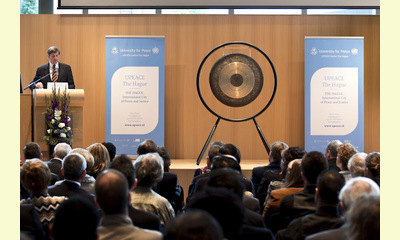|
|
Successful Inaugural Conference of UPEACE, The Hague
an article by UPEACE Centre, The Hague
On 20 September the new University for Peace
Centre The Hague, in short: UPEACE The Hague, was
launched during an international conference,
entitled “Peace for Humanity in the 21st Century”.
This inaugural conference was held at the
conference hall of the Peace Palace and was
attended by over 300 participants with a variety
of backgrounds, including more than 80 students
from The Hague institutions.

click on photo to enlarge
During the successful conference international
speakers shared their views on the theme of the
conference, in the presence of His Royal Highness
the Prince of Orange. The conference was chaired
by Marius Enthoven, chairman of UPEACE The Hague
and member of the UPEACE Council.
Keynote speakers during the morning session were
Amb. John J. Maresca (Rector UPEACE Costa Rica),
Ms Fatou Bensouda (Prosecutor International
Criminal Court), Mr Ruud F.M. Lubbers (Former
Prime-Minister of the Netherlands and Honorary Co-
Chair Earth Charter Initiative Council), Mr Martin
Lees (Former Assistant Secretary-General of the
United Nations), Mr Ben Knapen (Minister for
European Affairs and International Cooperation),
and Mr Steven van Hoogstraten (Director Carnegie
Foundation, Peace Palace). At the end of this
session UPEACE The Hague was officially opened by
Mayor Jozias van Aartsen of The Hague,
International City of Peace and Justice.
In the afternoon panel discussions were held on
the three programmes of UPEACE The Hague, namely:
Peace and Conflict Studies, Water and Peace, and
Urban Peace and Security. These three
interdisciplinary programmes will be further
developed by their programme leaders, resp. Ms
Berma Klein Goldewijk (UPEACE Affiliate Associate
Professor, Academic Director UPEACE The Hague), Mr
Henk van Schaik and Ms Quirine Eijkman, both
members of the Board of theAlliance for UPEACE.
The panel discussions were moderated by Professor
Rick van der Ploeg, University of Oxford.
At the end of the day Ms Julia Hoffmann, UPEACE
Assistant Professor, reflected on the afternoon
sessions. After the conference a reception was
offered to the participants, many of whom
expressing their good wishes for the future of
UPEACE and welcoming the new centre in The Hague!
Click here for full conference
programme and Photo-
gallery
|








|
DISCUSSION
Question(s) related to this article:
Peace education at the United Nations, how does it work?
* * * * *
LATEST READER COMMENT:
[Editor's note]: This is a continuation of the article by Oliver Rizzi Carlson, Culture of Peace Advocacy at the UN.
In the historic, international hallways of the United Nations, multitudes of people from every country in the world are busy going to meetings, addressing agenda items relevant to their governments and organizations, and making contacts. Lists are set, events are scheduled… agendas are largely inherited and predictable, presenting many issues and objectives that people have been working toward for a long time: goals of peace, prosperity, equality, justice. And yet, agendas still provide an incredible space to speak about the process by which those desires are achievable. Most of the time, documents just fall short of that transformative element, seeming to be longing for it. Peace education is seldom included; but once mentioned, it is immediately recognized for its relevance and importance. The “whats” are many and detailed in the world of international conference-making; the expertise of the “how” is a welcome newcomer to the discussion.
Advocating for peace education in the midst of governments, international organizations and even NGOs, few of which promote peace education directly, appears as a lonely journey. But as soon as one starts to speak about it, people’s eyes light up, new ideas and proposals flow, and diverse groups gather to talk about it further – it seems the momentum is building very quickly to create a real consciousness about peace education at the international and institutional level. Many also say it is “refreshing” to see youth doing this work. . ...more.

|
|









